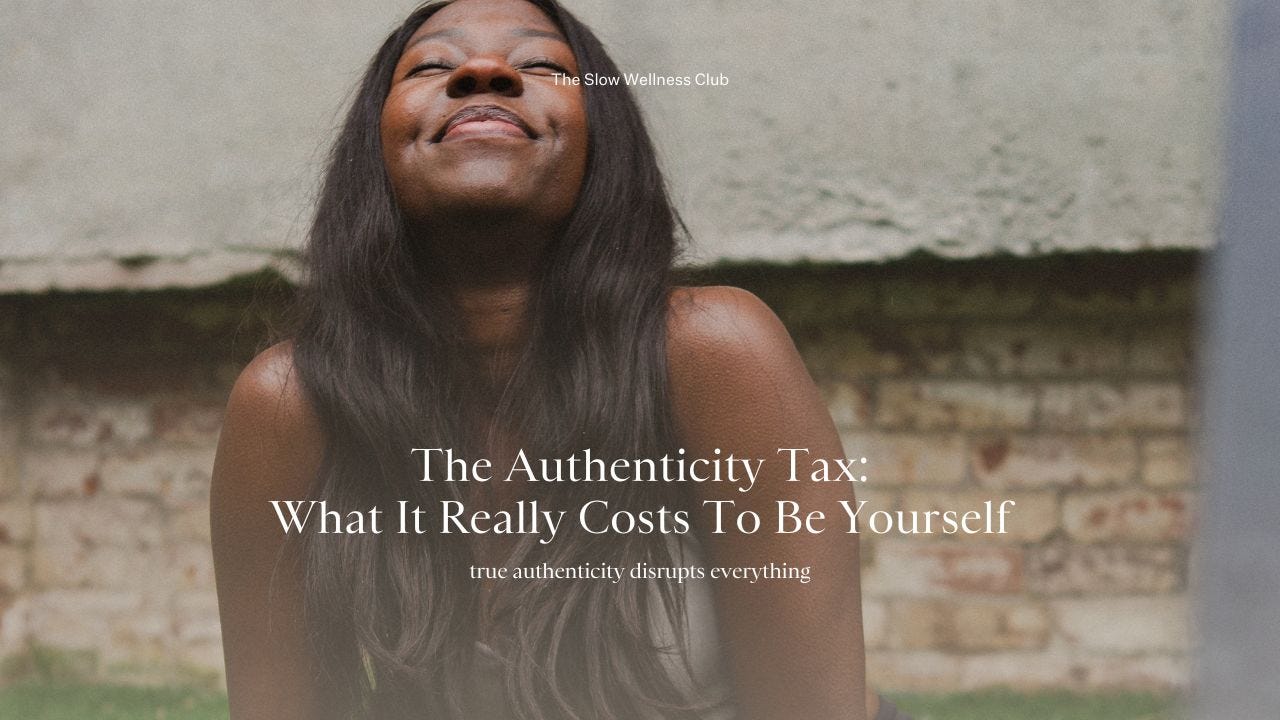🎧 Voice Notes from Me to You:
My close friends and I often send podcast-length voice notes to each other—it's our favourite way to share stories and stay connected. In that same spirit, here's my voice note to you. This is my way of bringing some real connection to our digital relationship.
Listen to get a personal note from me. The full article reading begins at 2:51 or scroll down to read for yourself.
TLDR: Summary
In this calmversation, Melissa Nkomo explores the concept of authenticity, particularly the challenges and costs associated with being true to oneself. She discusses the 'authenticity tax' that individuals, especially those from marginalized backgrounds, may face when choosing to express their true selves. The conversation delves into the tension between authenticity and the need for connection, the impact of authenticity on personal and professional relationships, and the broader implications of living authentically in a world that often rewards conformity. Ultimately, Melissa emphasizes the importance of authenticity as a journey towards self-acceptance and community building, despite the discomfort it may bring.
Each time I sit down to record lately, I find myself a little afraid to speak my truth. Not from fear of being wrong or vulnerable, but because being authentic has reopened some lifelong wounds.
I choose to express my most authentic self, and thanks to my ancestors, I get to. There's definitely no going back, but sometimes it doesn't feel as rewarding to my nervous system as it was promised to be.
As I close the divide between who I used to perform being and who my being truly is, now the reality of authenticity is hitting a bit differently.
The truth is some people find my authenticity off-putting. Maybe it's because choosing to be authentic disrupts the unspoken agreements that hold much of our social world together. In a culture built on politeness, performance, and perfection authenticity can feel like a breach of contract.
Too raw. Too honest. Too much.
Throughout the past five years, I've slowly come out of hiding. Step by step, I've walked down the path toward congruency and I've stopped abandoning myself.
I left a long-term relationship because even though it was going well deep down, I knew we had growing to do and not with each other. COVID completely changed the trajectory of my business and I realized that I needed more self-confidence in and more alignment with what I create.
From the ashes of all that was, I started the Slow Wellness Club.
It's a way to express and continue to explore the beauty and brilliance of self-regulation in the real world. It's also aligned action, towards being a part of a community that I dream of seeing in the world.
New chapters and new endeavours always bring about new places to feel, acknowledge, and grow into for me. As I challenge myself to share my knowledge and be seen online, I recognize that my desire to show up is also bringing with it a feeling of anxiety.
For so much of my life, survival meant suppressing my truth. I learned to tune out my intuition, to silence my needs, to become who I thought others wanted me to be. Over time, that disconnection from myself became my normal state. I didn't even know that I had lost myself.
But as always, my body knew. My body felt the tension, the stress, the internal contradiction. I did everything I could to numb and distract away from my body's signals. But the inner dissonance, the gap between my realest self and the self that I had created to maintain acceptance and safety was so wide, I had no choice but to build a bridge and come home to myself.
So I did. I still am… through my business, through my body, through my life.
In all of my work, I recognize that I'm in search of a place where I can also feel at home. A place where I don't feel like I have to be lovable to exist. I can exist as love itself. And in an online world that is filtered and measured and wide open to critics and trolls, I can feel myself wanting to stay hidden.
I notice that there is a tension between my sense of authenticity and my desire for connection.
Dr. Gabor Mate, who I deeply admire, is a physician and expert in trauma and childhood development. He speaks to this tension as a core theme in human suffering. He says, as human beings, we have two fundamental needs. The need for attachment, or what I call connection, to be loved, accepted, and connected to others. And the need for authenticity, our connection to ourselves, our gut feelings, our truth. When these needs come into conflict, when being authentic risks the loss of attachment or connection, we will choose attachment every time.
That's how we survive.
Mate is describing what might be the most fundamental human dilemma. This conflict explains so much about why authenticity feels a little dangerous to me lately. It's the risk of what I might lose if I show up as my most authentic self.
And there are times when it feels like I am torn, that I have to choose between being true to myself and staying in alignment with my values, or maintaining connections that feel essential to my success and overall sense of safety.
The situation with my studio is the most recent trigger for my investigation and my inquiry into my relationship with authenticity and the authenticity tax. As this version of myself, this pattern of choosing authenticity over comfort played out dramatically in the ultimate demise of my studio.
I chose to remain my authentic self. And in doing so, my authenticity disrupted hierarchy and corporate structure and challenged the status quo. Choosing not to play the game unsettled those who benefited from performance, politeness, subjugation, and assimilation.
In short, it put a target on my back.
I've spent many nights reflecting on how my choice to stay in alignment and to be authentic Ultimately impacted an entire community of folks.
I've discovered the same tension in my romantic life. I know everyone talks about how hard it is to be single these days, but I think beyond the problematic nature of dating apps and the loneliness pandemic, I think there's a culture of performance that is often more desirable and rewarded than the practice of presence.
Many people fawn, filter, or withhold in an attempt to stay safe in early connection. Collectively, the dating pool has not yet built the emotional capacity to meet realness with respect or grace. It feels too scary and sometimes even unsafe to the nervous system, especially a nervous system that lacks discernment.
To be authentic is to be seen, and to be seen is to risk being unloved.
All of these insights, both personally and professionally, have truly been bubbling up to the surface lately. And while I don't regret or shame myself for choosing authenticity, I am starting to notice the ripple effect, both positive and negative, from choosing to live as my most authentic self.
Prior versions of myself chronically chose connection over authenticity. But in hindsight, I know that staying in those professional or romantic relationships would have never truly nourished me because they would have required a false version of myself, and upholding that version of myself created its own form of deep loneliness.
On the flip side, being my most authentic self is also triggering those who are uncomfortable in the presence of a dark skinned black woman living not from a place of survival, but of alignment. And that's a new form of loneliness that I've been feeling and sitting with lately.
As I let go of the coping mechanisms, masks, and identities I built for survival, I've had to learn how to tolerate the discomfort that comes with being authentic, slowly building the capacity to risk connection in service of my truth. I'm developing enough internal security to handle the possibility that some people might leave when I show up as myself, and ultimately, I do know that that is a blessing; trusting that the relationships that remain will be more genuine and more sustaining.
What I've started to learn and understand is that authenticity is not just a spiritual or philosophical concept. It's an energetic disruptor that is hardwired into our nervous systems. It invites truth, demands integrity, and exposes illusion. When we are in touch with our true selves, we show up with clearer boundaries, deeper empathy, and less reactivity. Our inner alignment truly does ripple outward into more honest relationships and conscious communities.
But what I wish we talked about more honestly is what being authentic can also potentially cost. We celebrate it as this beautiful liberating force, and it is, but rarely is it acknowledged that it demands a certain tax, especially from those of us whose authentic selves challenge the status quo.
We don't talk enough about how choosing authenticity can feel like choosing loneliness, and at times, even choosing harm or a lack of safety. It can disrupt relationships, cost opportunities, and leave us questioning whether being real is truly worth the price.
What I would argue is that much like therapy or deep self-regulation practices, authenticity isn't meant to be easy or peaceful all the time. It's meant to help us become more of ourselves and actually like who we are when we meet ourselves in quiet moments. The work isn't comfortable, but it is necessary.
Choosing authenticity requires us to tolerate a certain level of discomfort in service of something deeper, something greater.
At the end of the day, where I stand on my journey currently, I can say with certainty that the cost of not being authentic is even steeper. The energy it took to maintain a false version of myself, the chronic disconnection from my truth, the way inauthenticity slowly eroded my sense of self, that tax compounded over time until I could barely recognize who I was beyond this oscar-worthy performance as “the good girl” or “the palatable girl”.
I was exhausted. I was anxious. I was a version of myself that I would never recognize even if I were to pass her down the street. So today and every day forward, I choose authenticity. Not because it's easy, but because it's the only way I know how to build something real in my business, in my relationships, in my community. I choose it because when I look in the mirror, I want to recognize the person looking back at me. I choose it because the relationships that remain when I show up as myself are the ones that I know are worth having.
So as I build businesses and connections and relationships with and from my heart, this isn't just a journey of strategy or analytics. It's not a chase for clout or likes or status. It's an evolution.
A journey home to my highest self and the expression of my highest self. In that personal work lies the ripple effect of building a legacy of authenticity, community care, and peace.
XO Mel
Community,
What does being authentic feel like in your body. When you express your deepest truth, what do you notice arises in your body?
Thank you for taking the time to explore The Slow Wellness club, my intentional online space to share guidance and insights filled with truth, wisdom, and healing. My life’s work is to inform others of the potential that self-regulation and authentic expression have to positively impact our lives - individually and collectively. If my work resonates with or supports you, I would be grateful if you could share it with a friend or loved.





